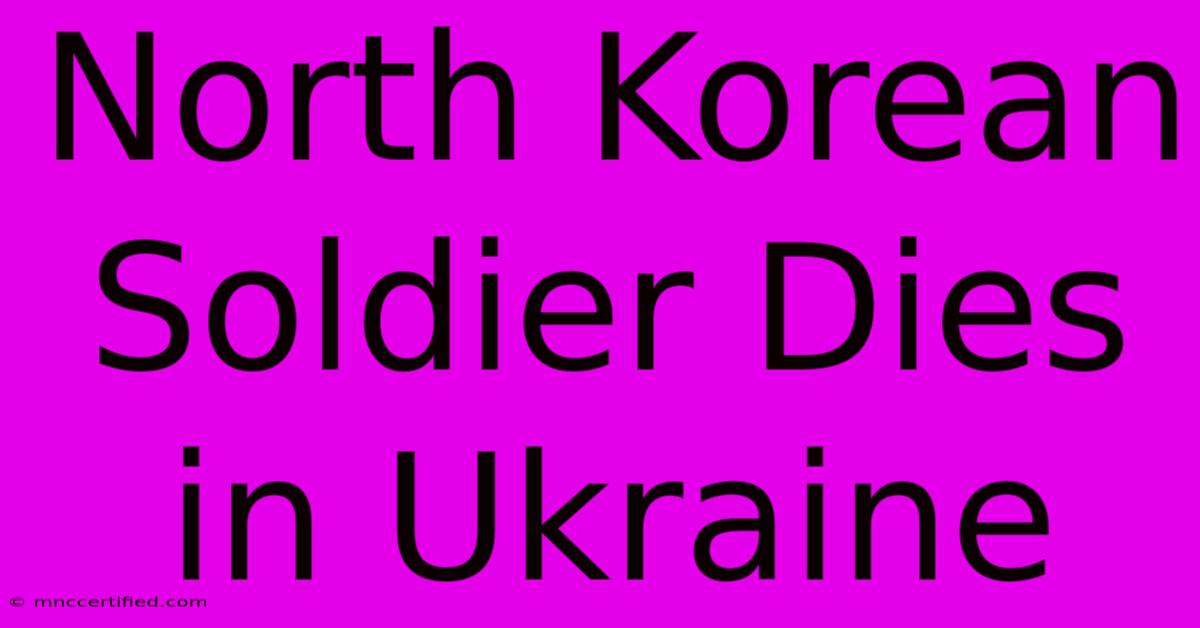North Korean Soldier Dies In Ukraine

Table of Contents
North Korean Soldier Dies in Ukraine: Unverified Reports and Geopolitical Implications
The recent reports of a North Korean soldier's death in Ukraine have sparked significant interest and raised crucial questions about Pyongyang's involvement in the ongoing conflict. While the information remains largely unverified and shrouded in uncertainty, the potential implications for the geopolitical landscape are substantial. This article will delve into the available information, analyze the potential motivations behind such involvement, and explore the wider ramifications for international relations.
Unverified Reports and Lack of Official Confirmation
News outlets have reported on the alleged death of a North Korean soldier fighting in Ukraine, citing various sources. However, crucial information, such as the soldier's identity, unit, and circumstances of death, remains largely unavailable. The lack of official confirmation from either North Korea or any international organizations adds to the uncertainty surrounding these claims. This absence of official statements fuels speculation and makes definitive conclusions difficult to draw.
The Importance of Source Verification
It is imperative to emphasize the need for critical evaluation of information sources. The ongoing conflict in Ukraine has created an environment ripe for misinformation and propaganda. Therefore, relying solely on unverified reports can lead to inaccurate conclusions and the spread of disinformation. Readers should always cross-reference information from multiple reputable sources before accepting any claim as factual.
Potential Motivations Behind North Korean Involvement
Several potential explanations have been suggested for North Korean involvement in the Ukraine conflict, though none are definitively proven:
Wagner Group Recruitment?
One leading theory involves the recruitment of North Korean soldiers by the Wagner Group, a Russian private military company. The Wagner Group has a history of recruiting mercenaries from various countries, and North Korea, facing economic hardship, might see such an arrangement as a potential source of income for its soldiers. However, no concrete evidence has emerged to confirm this hypothesis.
Ideological Alignment with Russia?
Another perspective points to North Korea's alignment with Russia in its opposition to the West. Given Pyongyang's longstanding adversarial relationship with the United States and its pursuit of nuclear weapons, an alliance with Russia against shared adversaries could be considered. This suggests a potential ideological motivation for involvement, but again, lack of concrete evidence prevents a definitive conclusion.
Geopolitical Implications and Future Outlook
Even if the reports of a North Korean soldier's death are ultimately confirmed, determining the extent of North Korean involvement in the conflict remains challenging. The potential consequences, however, are far-reaching:
- Escalation of the Conflict: Increased North Korean involvement could significantly escalate the war, introducing a new level of complexity to an already volatile situation.
- International Sanctions: Confirmed involvement could lead to further international sanctions against North Korea, exacerbating its already dire economic situation.
- Strain on International Relations: The involvement of North Korea could further strain relations between major global powers, potentially impacting broader geopolitical strategies.
The Need for Continued Monitoring
The situation surrounding North Korean involvement in the Ukraine conflict demands continued monitoring and careful analysis. The absence of concrete evidence necessitates a cautious approach to reporting and interpretation. Independent investigations and the release of verifiable information from credible sources are crucial to understanding the full picture.
Conclusion: Uncertainty and the Need for Caution
The reports of a North Korean soldier's death in Ukraine highlight the uncertain and rapidly evolving nature of the conflict. While the information remains largely unverified, the potential geopolitical implications are undeniable. It is crucial to maintain a critical perspective, prioritize verified information, and remain vigilant in monitoring developments in this complex and volatile situation. The international community must strive for transparency and accountability to navigate the implications of this potential development effectively.

Thank you for visiting our website wich cover about North Korean Soldier Dies In Ukraine. We hope the information provided has been useful to you. Feel free to contact us if you have any questions or need further assistance. See you next time and dont miss to bookmark.
Featured Posts
-
Anita Rani Dark Side Of Divorce
Dec 28, 2024
-
Chat Gpt Service Disruption User Reports
Dec 28, 2024
-
Update Fabianski Conscious
Dec 28, 2024
-
Where To Watch Oklahoma Vs Navy Game
Dec 28, 2024
-
Hershey 2025 Family Vacation Guide
Dec 28, 2024